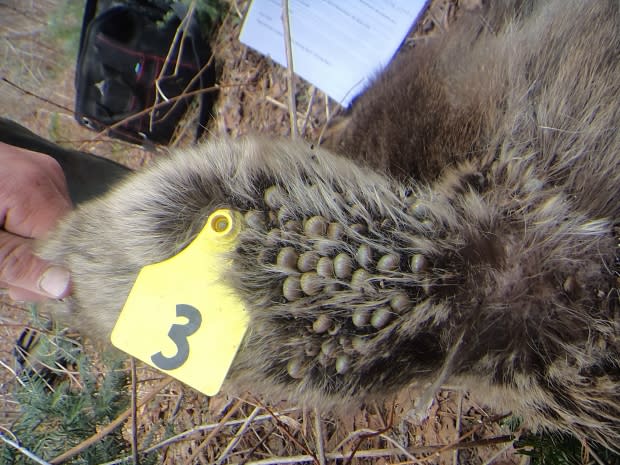Climate change driving 'ghost moose' calf mortality, say researchers
Tick infestations are killing moose calves in the northeastern U.S. at an alarming rate and climate change is to blame, according to a recent study.
The dead moose calves with pale or missing patches of fur, drained of their blood from parasitic winter ticks, are part of a phenomenon known as "ghost moose" which affects young and old, but with far more devastating consequences for calves.
In a study recently published in the Canadian Journal of Zoology, researchers from the University of New Hampshire tracked 179 nine- to 10-month-old moose calves in New Hampshire and Maine through winter and found that 70 per cent of the calves were dying over a three-year period.
Pete Pekins is a professor of wildlife ecology at the University of New Hampshire and the lead researcher on the winter ticks and moose research.
"Anything that's dependent on ambient temperature is going to be the most affected by slight changes in temperature and in slight changes in season," he said.
"In this case, that tick is a parasite that's given more time to find a host. Moose are just exposed to this potential parasite load for a longer period of time."

Calves had an average infestation of more than 40,000 winter ticks.
The ghost moose appearance is a result of hordes of clustering winter ticks feasting on the animals resulting in anemia, lethargy and death.
"What happens to these animals is their body is responding trying to produce blood," said Pekins. "They have to replace it."
But the moose diet consists of virtually zero protein to compensate for the loss, leading to death.
The study notes that declining moose populations have been seen in Minnesota, Manitoba, Nova Scotia and through the northeastern United States.
The researchers expect the problem to reach further north as climate change continues.
Fighting climate change with 'two-eyed seeing'
Clifford Paul, a Mi'kmaw hunter and gatherer, works out of Cape Breton as the co-ordinator of the moose management initiative with the Unama'ki Institute of Natural Resources in Nova Scotia.
"They're having great difficulty surviving," he said of the calves.
Moose are an intrinsic part of Mi'kmaw culture and life, as a source of food, clothes and tools.

Paul said climate change needs to be fought with an approach that looks to both traditional knowledge and western scientific knowledge.
"We're the ones who have ecological memory based on oral tradition," he said. "I might live for 75 years but my knowledge is thousands of years old."
He called it a "two-eyed seeing" approach, one eye looking to strengths of traditional knowledge and the other to western science to find a solution together.
He said any management plan that takes such an approach is a step forward and "also a step that makes our ancestors very proud."

